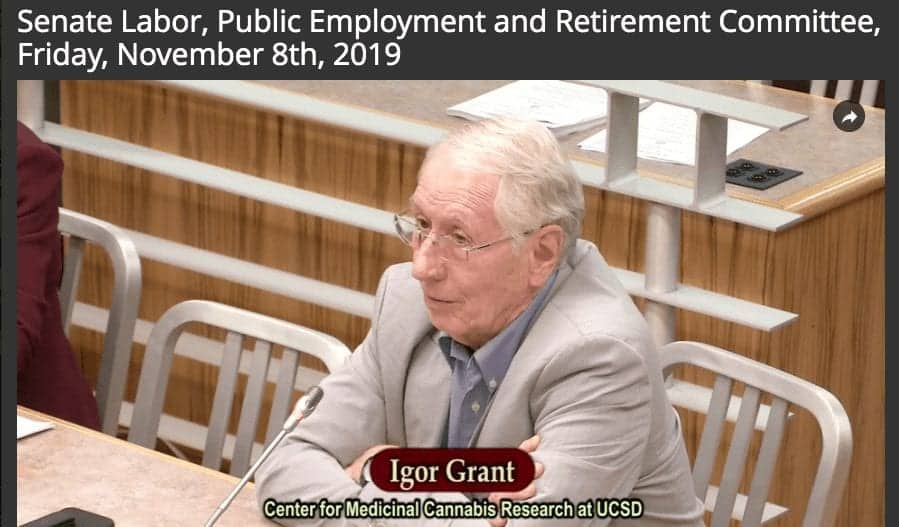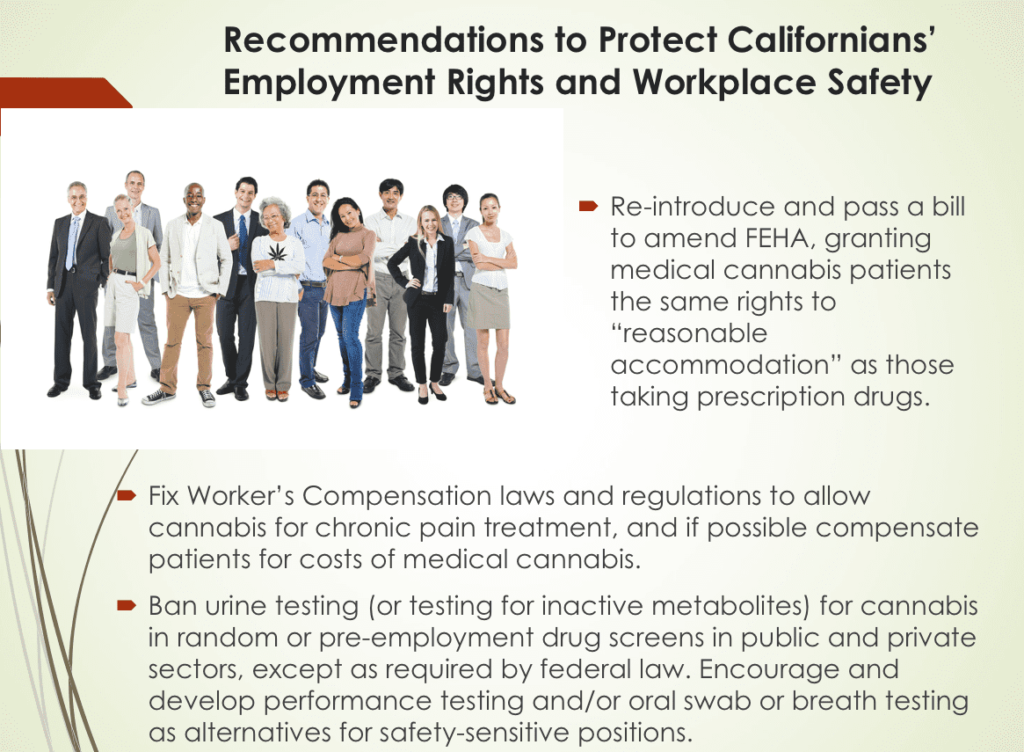November 9, 2019 – California NORML called for state legislation to protect employment rights of cannabis consumers at an informational hearing on cannabis and employment held on Friday, November 8 in the Senate Labor, Public Employment, and Retirement committee. Find audio and video recordings of the hearing
“Even though cannabis is now legal for adult use, and has been legal for medical use since 1996 in California, employees in our state can still be fired or denied employment for testing positive for cannabis, even if they used it days before, or need it to treat a serious illness,” Ellen Komp, Cal NORML deputy director, testified. “The result is to unfairly discriminate against qualified workers, deny them medical treatment with cannabis, and oftentimes compel them to depend on opiates and other more hazardous drugs.”
Sixteen other states and Washington, DC have enacted statutes protecting qualified medical cannabis users from workplace discrimination. Recently, the states of Maine and Nevada, and New York City, have moved to protect the employment rights of recreational cannabis users against pre-employment drug screening.
A great many studies, including state-sponsored studies at UCSD, have shown cannabis to be effective for pain. Other studies have found that cannabis use can allow patients to reduce their use of opiates.
Scientific reviews have not found good evidence that cannabis is associated with occupational injuries.[i] Some studies have even suggested that marijuana is associated with lower workplace fatalities.[ii],[iii] More studies suggest liberalized marijuana laws are associated with greater labor participation, lower rates of absenteeism, and higher wages.
Cal NORML’s recommendations to the committee and the legislature are:
- Extend FEHA (Fair Employment and Housing Act) workplace protections to grant medical cannabis patients the same rights to “reasonable accommodation” as those taking prescription drugs.
- Amend workers’ compensation laws and regulations to allow cannabis for chronic pain treatment, and if possible compensate patients for costs of medical cannabis.
- Ban urine testing (or testing for inactive metabolites) for cannabis in random or pre-employment drug screens in public and private sectors, except as required by federal law. Encourage and develop performance testing and/or oral swab or breath testing as alternatives for safety-sensitive positions.
 Also testifying was Dr. Igor Grant of the state-funded Center for Medicinal Cannabis Research at UCSD. Dr. Grant testified about the Center’s findings that cannabis is useful in treating intractable neuropathic pain in HIV and diabetic patients, and pointed the committee to the 2017 National Academy of Sciences review of cannabis studies, which found there is “conclusive or substantial evidence” that cannabis is effective for the treatment for chronic pain.
Also testifying was Dr. Igor Grant of the state-funded Center for Medicinal Cannabis Research at UCSD. Dr. Grant testified about the Center’s findings that cannabis is useful in treating intractable neuropathic pain in HIV and diabetic patients, and pointed the committee to the 2017 National Academy of Sciences review of cannabis studies, which found there is “conclusive or substantial evidence” that cannabis is effective for the treatment for chronic pain.
On workplace safety, Dr. Grant said in written testimony he provided, “What we have come to appreciate through our studies on driving under the influence of cannabis is that blood and other fluid levels of various cannabinoids correlate poorly with impairment. A person can have detectable cannabinoids, such as THC, in the blood or oral fluid, but not be cognitively impaired, since these levels may reflect on-going, low-level use, such as in medicinal cases, or a single use that occurred many hours or even days previously. We would recommend instead, if safety or competency are concerns, that there be behavioral evaluations that map onto what a person is actually required to do, just as in the case of certifications for some professionals like airplane pilots.”
Dr. Grant re-iterated these statements in oral testimony, and added, “Employees and students who receive medical cannabis should not be judged to be impaired or unqualified based only on chemical tests, but instead should be evaluated based on behavioral assessments that are relevant to their occupation.”
Read more about Cal NORML’s employment rights campaign.
Find audio and video recordings of the hearing
[i] An NAS review reported, “The Committee did not identify a good- or fair-quality systematic review that reported on the association between cannabis and occupational injury” The Health Effects of Cannabis and Cannabinoids,” National Academies Press 2017, p. 222.
[ii] Legalizing medical cannabis was associated with a 19.5% reduction in workplace fatalities among workers aged 25-44 according to a study by Anderson D M, Rees DI, Tekin E, “Medical marijuana laws and workplace fatalities in the United States,” International Journal of Drug Policy October 2018, pp 33-9.]
[iii] In a study of coal miners, those who tested positive for cannabis were found to be less likely to be involved in accidents than those who were drug-free. In contrast, workers using opiates were more likely to have accidents. Price JW, “Comparison of random and post-accident urine drug tests in southern Indiana miners,” J Addict Med. 2012 Dec; 6(4): 253-7; and Price JW, “A comparison of random and post-accident urine opiate and opioid tests,” J Addict Dis. 2015: 34(1): 36-42

